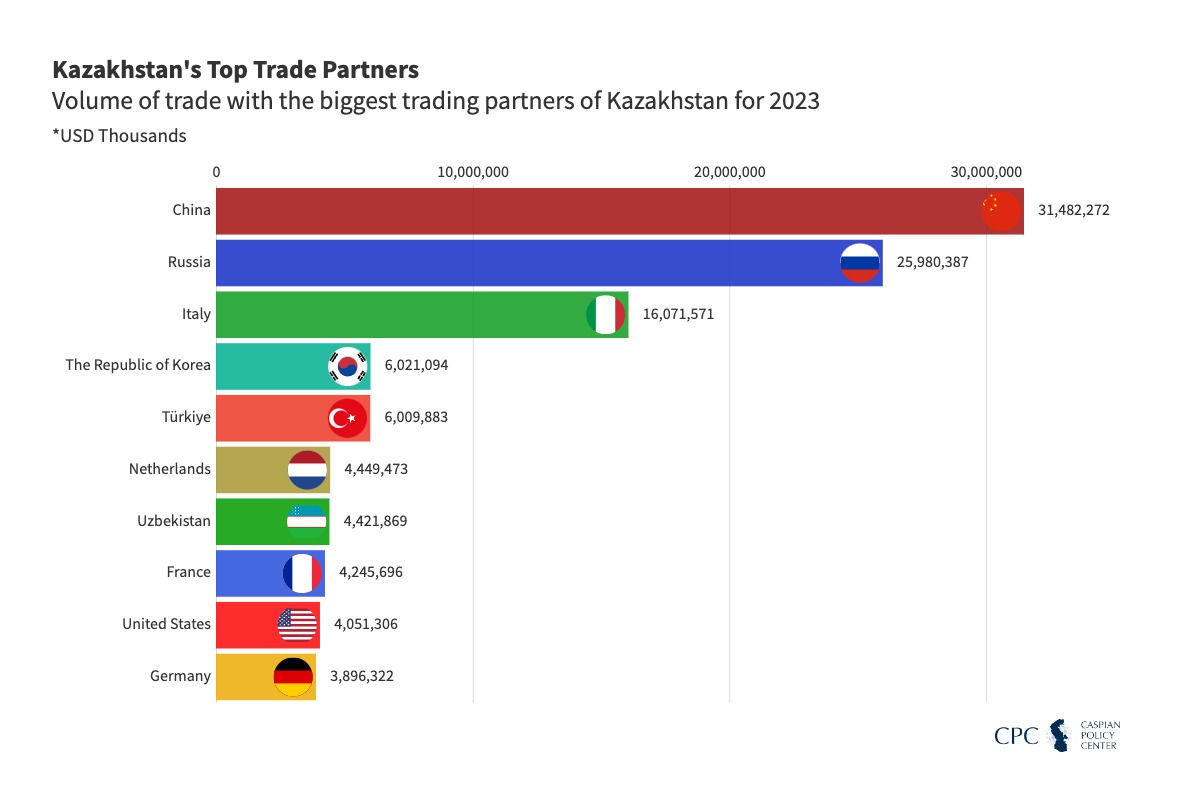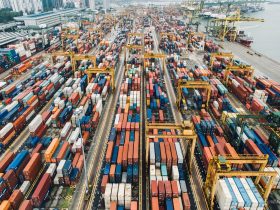
Kazakhstan’s main trading countries
Kazakhstan’s strategic location in Central Asia and its rich natural resources, including oil, gas, and minerals, make it a key player in international trade. The country maintains diverse trade relationships, with a focus on energy exports and imports of machinery, vehicles, and consumer goods. Below is an overview of Kazakhstan’s main trading partners:
China
China is one of Kazakhstan’s largest trading partners, driven by its Belt and Road Initiative (BRI) and Kazakhstan’s position as a crucial transit route. Bilateral trade is dominated by Kazakhstan’s exports of crude oil, natural gas, and metals, while imports primarily consist of machinery, electronics, and manufactured goods. The two countries have also strengthened their cooperation through the Shanghai Cooperation Organization (SCO) and infrastructure projects like the Khorgos Gateway.
Russia
Russia is another key trading partner for Kazakhstan due to their shared border and membership in the Eurasian Economic Union (EAEU). Trade is facilitated by reduced tariffs and streamlined customs processes within the union. Kazakhstan exports oil, metals, and agricultural products to Russia, while importing machinery, vehicles, and foodstuffs. The energy sector, including shared pipelines, represents a significant area of collaboration.
European Union
The European Union (EU) is a major trading bloc for Kazakhstan, particularly for its energy exports. Countries like Italy, the Netherlands, and Germany are leading importers of Kazakh oil and natural gas. In return, Kazakhstan imports machinery, pharmaceuticals, and luxury goods from the EU. The Enhanced Partnership and Cooperation Agreement (EPCA), signed in 2015, has strengthened economic ties.
Turkey
Turkey serves as both a trade partner and a cultural ally, given their shared Turkic heritage. Kazakhstan exports metals, crude oil, and agricultural products to Turkey, while importing textiles, machinery, and consumer goods. The two nations are members of the Organization of Turkic States, which promotes regional trade and cultural cooperation.
United States
While not as significant as China or Russia, the United States is an important trade partner for Kazakhstan. The U.S. imports uranium, oil, and other raw materials from Kazakhstan, while exporting machinery, technology, and aircraft. American companies are also heavily invested in Kazakhstan’s oil and gas sectors.
South Korea
South Korea is a growing trade partner for Kazakhstan, focusing on technology and manufacturing. Kazakhstan exports minerals and metals, while South Korea supplies electronics, vehicles, and heavy machinery. Cooperation extends to education and culture, enhancing their bilateral relations.
Uzbekistan and Central Asia
Within Central Asia, Uzbekistan is a key trading partner, reflecting regional economic integration. Trade with Uzbekistan includes agricultural products, textiles, and industrial goods. Kazakhstan also engages in trade with other neighboring countries, such as Kyrgyzstan and Turkmenistan, largely in agriculture and energy.
Middle East
Kazakhstan has been expanding trade relations with Middle Eastern countries, particularly the UAE and Saudi Arabia. These countries import metals, grains, and energy products while exporting investment and technology to Kazakhstan. The Astana International Financial Centre (AIFC) plays a vital role in fostering these ties.
Conclusion
Kazakhstan’s trade landscape is shaped by its geographic position, natural resources, and active participation in regional and global economic frameworks. Its main trading partners include China, Russia, the EU, Turkey, and others, with a strong focus on energy exports and the import of machinery and consumer goods. As Kazakhstan continues to diversify its economy, its trade relationships are likely to evolve, further solidifying its role as a key hub in Eurasian trade networks.




Leave a Reply